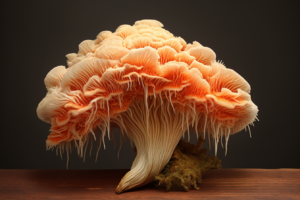Lion’s mane mushroom, also known as Hericium erinaceus, has recently been getting a lot of attention for its potential health benefits. Among these is its purported ability to improve digestive health, an area where many people struggle with chronic issues such as bloating and constipation. In this article, we explore the link between lion’s mane and digestive health, examining the evidence behind it and discussing why this fungus might be worth trying for anyone looking to improve their gastrointestinal function. So if you’ve been curious about whether lion’s mane could be the key to better digestion, read on!
Understanding the Digestive System: A Brief Overview
The digestive system is a complex network of organs and processes that work together to break down food into usable nutrients for the body. It begins with the mouth, where enzymes in saliva begin breaking down carbohydrates, and continues through the esophagus, stomach, small intestine, large intestine, and rectum. Along the way, various organs such as the liver and pancreas also play important roles in digestion.
 Understanding how the digestive system works can help individuals make informed choices about their diet and lifestyle.
Understanding how the digestive system works can help individuals make informed choices about their diet and lifestyle.
For example, consuming foods high in fiber can help prevent constipation by adding bulk to stool while drinking plenty of water can aid in digestion by allowing food to move more easily through the intestines.
Additionally, certain supplements like lion’s mane mushroom may offer potential benefits for improving gut health.
Overall, taking care of our digestive health is an important aspect of overall well-being. The intricate processes involved in digestion have wide-ranging effects on other areas of our bodies – from immune function to mood – making it crucial to prioritize this often-overlooked system.
What is Lion’s Mane Mushroom and How Does It Work?
Lion’s Mane mushroom is a type of fungus that grows in North America, Asia and Europe. It has been used for centuries as a medicinal mushroom due to its many health benefits. This unique mushroom is known for its white, shaggy appearance resembling the mane of a lion. Lion’s Mane contains bioactive compounds called erinacines which have been shown to improve cognitive function, boost immunity, and reduce inflammation in the body.
When it comes to digestive health, research suggests that Lion’s Mane may help promote healthy gut bacteria balance and reduce inflammation in the gut lining. Studies conducted on animals show that this potent fungus may also increase the production of beneficial short-chain fatty acids (SCFAs) which help nourish intestinal cells and protect against colon cancer. As such, incorporating Lion’s Mane into your diet through supplements or food products could be an effective way to support overall digestive wellness and potentially alleviate chronic gastrointestinal issues like bloating or constipation.
Scientific Evidence: Studies on Lion’s Mane and Digestive Health
Scientific evidence shows that lion’s mane mushroom may have potential health benefits for improving digestive health. Lion’s mane has been found to contain properties that can help regulate the digestive system, reduce inflammation and promote a healthy gut microbiome. Studies have shown that regular consumption of lion’s mane supplements or tea may alleviate symptoms of irritable bowel syndrome (IBS) and improve overall gastrointestinal function.
Furthermore, research conducted on animal subjects has suggested that prolonged use of lion’s mane supplementation could lead to enhanced intestinal barrier function, which helps prevent harmful substances from entering the bloodstream. This is significant as a compromised intestinal barrier is linked with chronic diseases such as autoimmune disorders and obesity. Scientific evidence suggests incorporating lion’s mane into one’s diet in moderation can positively impact one’s gastrointestinal health and potentially contribute to long-term wellness when paired with an existing healthy lifestyle regimen.
Lion’s Mane vs Probiotics: Which is Better for Digestive Health?
Both lion’s mane and probiotics have been touted as potentially beneficial for digestive health. Lion’s mane mushroom contains compounds that may help with inflammation and gut barrier function, while probiotics are live bacteria that can improve the balance of microorganisms in the digestive system. While both have potential benefits, it is important to note that they work differently.
 Lion’s mane may be effective for people who struggle with chronic issues such as bloating and constipation due to its anti-inflammatory properties. However, research on its efficacy is still limited. Probiotics, on the other hand, are better studied and have been shown to improve symptoms of conditions such as irritable bowel syndrome (IBS).
Lion’s mane may be effective for people who struggle with chronic issues such as bloating and constipation due to its anti-inflammatory properties. However, research on its efficacy is still limited. Probiotics, on the other hand, are better studied and have been shown to improve symptoms of conditions such as irritable bowel syndrome (IBS).
Ultimately, whether lion’s mane or probiotics are better for you will depend on your individual needs and symptoms. It is best to consult a healthcare professional before adding either supplement to your routine to ensure their safety and effectiveness.
Potential Side Effects and Risks of Lion’s Mane Consumption
While lion’s mane mushroom has been touted for its health-promoting benefits, it is important to be aware of the potential side effects and risks associated with its consumption. Some individuals may experience allergic reactions such as itching, rash or breathing difficulties after consuming lion’s mane. This mushroom may also interact negatively with certain medications and supplements, potentially causing adverse effects.
Additionally, some animal studies have suggested that high doses of lion’s mane can have neurotoxic effects. Although human studies are limited in this area, cautious use is advised when considering long-term or high-dose consumption of this mushroom extract. As with any dietary supplement or new food product, consulting a healthcare provider before adding lion’s mane to your diet can help you make informed choices about its safe and appropriate use.
How to Incorporate Lion’s Mane into Your Diet for Optimal Digestive Health
Incorporating lion’s mane into your diet may offer significant benefits for digestive health. This mushroom has been shown to foster the growth and activity of good gut bacteria, leading to better digestion and absorption of nutrients. One way to consume lion’s mane is through supplements or extracts, which can be easily added into smoothies or taken in capsule form.
Additionally, you can also incorporate it directly into your cooking by adding sliced lion’s mane mushrooms to dishes such as stir-fries and soups. Keep in mind that while there is promising evidence supporting the benefits of lion’s mane for digestive health, more research is needed to fully understand its effects on the body. As with any dietary change or supplement addition, it’s essential to consult a healthcare professional before incorporating it into your routine.
Lion’s Mane and Beyond: Other Natural Remedies for Digestive Issues
Lion’s Mane is a type of medicinal mushroom that has been traditionally used in Chinese medicine for centuries. Recent studies have illuminated the full range of potential benefits from this fungus, with digestive health being one area of particular interest. Lion’s Mane contains beta-glucans and polysaccharides which help manage inflammation and bolster immune function, aiding digestion.
However, while lion’s mane in combination with good gut bacteria could support dietary fat absorption, there are other natural remedies recommended by doctors to maintain overall digestive health: It is essential to maintain healthy bowel habits and reduce stress – chronic stress can lead to gastrointestinal issues like heartburn or acid reflux as well as inhibiting regular stool formation. Consuming probiotic foods such as kefir or kimchi can enhance gut microbiota levels dependent on an individual’s bodily needs. Ginger teas regulate appetite-stimulating hormones called ghrelin and leptin leading to balanced gastric emptying cycles ultimately preventing stomach disorders like nausea/vomiting indigestion/constipation etcetera. A holistic approach might include incorporating some diet changes with physician recommendations along with taking natural supplements to aid digestion could provide significant results towards healthier living habits.

To Summarize:
Lion’s Mane, a remarkable medicinal mushroom species, has been linked to numerous health benefits, most notably those involving the digestive tract and brain health. This fungus is rich in unique compounds like hericenones and erinacines that can stimulate the growth of brain cells, contributing to improved mental health and reduced symptoms of anxiety and depression.
Research suggests that Lion’s Mane is highly beneficial for digestive health. It has been found to support the intestinal immune system, bolster overall health, and provide relief anywhere along the digestive tract. In one study, it was found that taking a mushroom supplement containing Lion’s Mane significantly reduced digestive tract symptoms. However, more human studies are needed to solidify these findings.
Interestingly, Lion’s Mane may also aid in heart health and help manage mild cognitive impairment. Among 14 different mushroom species studied for health benefits, Lion’s Mane ranked fourth highest. Animal studies have shown promising results, with one indicating that a Lion’s Mane extract significantly extended the lifespan of mice.
Despite these potential benefits, it is essential to keep in mind that individual responses to supplements like Lion’s Mane can vary. In some cases, side effects such as allergies may occur, so those allergic to mushrooms should avoid Lion’s Mane. As a safety measure, appropriate dosage and continuous monitoring of response are recommended when taking Lion’s Mane mushroom or its extract.
In conclusion, Lion’s Mane has potential in promoting digestive and brain health, but more research is needed to fully understand its impact and safety.
Commonly Asked Questions:
Q: What is Lion’s Mane mushroom and its extracts?
A: Lion’s Mane is an edible mushroom with white, cascading spines that resemble a lion’s mane. Lion’s Mane mushroom extract is a supplement made from the fruit bodies or mycelium of the mushroom.
Q: What are the health benefits of Lion’s Mane mushroom extract?
A: Lion’s Mane mushroom extract has been linked to a variety of health benefits, including improved brain health and function, reduced symptoms of depression and anxiety, and improved digestive tract function.
Q: What compounds in Lion’s Mane mushroom extract are responsible for its health benefits?
A: Lion’s Mane mushroom extract contains several bioactive compounds that can stimulate nerve growth and repair, such as hericenones and erinacines.
Q: How does Lion’s Mane mushroom extract improve digestive tract function?
A: Lion’s Mane mushroom extract contains polysaccharides that can improve the quality of life in those with chronic digestive tract issues, such as irritable bowel syndrome (IBS).
Q: How does Lion’s Mane mushroom extract reduce symptoms of depression and anxiety?
A: Research has suggested that Lion’s Mane mushroom extract may reduce symptoms of depression and anxiety by promoting nerve growth and repair in the nervous system.
Q: What dosage of Lion’s Mane mushroom extract is recommended for its health benefits?
A: Dosage recommendations for Lion’s Mane mushroom extract vary, but studies suggest that taking 500-3000mg per day may provide benefits.
Q: Can Lion’s Mane mushroom extract be used to treat nervous system injuries?
A: Some research has suggested that Lion’s Mane mushroom extract may have potential for treating nervous system injuries, but more research is needed to confirm these findings.
Q: What are the safety and side effects of Lion’s Mane mushroom extract?
A: Lion’s Mane mushroom extract is generally regarded as safe, with few reported side effects. However, some people may experience digestive issues or allergic reactions.
Q: What animal studies have been conducted on Lion’s Mane mushroom extract?
A: Animal studies have found that Lion’s Mane mushroom extract can improve cognitive function, promote nerve growth and repair, and increase the lifespan of mice injected with cancer cells.
Q: How does Lion’s Mane mushroom extract compare to other mushroom supplements?
A: In a study examining the abilities of 14 different mushroom species, Lion’s Mane had the fourth highest antioxidant activity. A mushroom supplement containing 14 different mushroom species found that Lion’s Mane extract daily nearly quadrupled the concentration of hericenones and erinacines in the blood.
Q: What further studies are needed to determine the efficacy of Lion’s Mane mushroom extract for health and wellness?
A: While research has suggested that Lion’s Mane mushroom extract may have a variety of health benefits, more studies are needed to confirm these findings and determine the optimal dosage and method of administration.
Q: What are the symptoms of depression and anxiety?
A: The symptoms of depression and anxiety include feelings of sadness or hopelessness, trouble sleeping or concentrating, decreased energy, and changes in appetite or weight.
Q: What does the nervous system consist of?
A: The nervous system consists of the brain, spinal cord, and nerves that transmit signals throughout the body.
Q: Have there been studies conducted on the side effects of Lion’s Mane mushroom extract?
A: Research has examined the side effects of Lion’s Mane mushroom extract and has found that it is generally safe for consumption. However, individuals with allergies to mushrooms or with pre-existing medical conditions should consult with a healthcare professional before taking Lion’s Mane mushroom extract supplements.



 Lion’s Mane and Anxiety: Mushroom Helps Reduce Anxiety
Lion’s Mane and Anxiety: Mushroom Helps Reduce Anxiety
